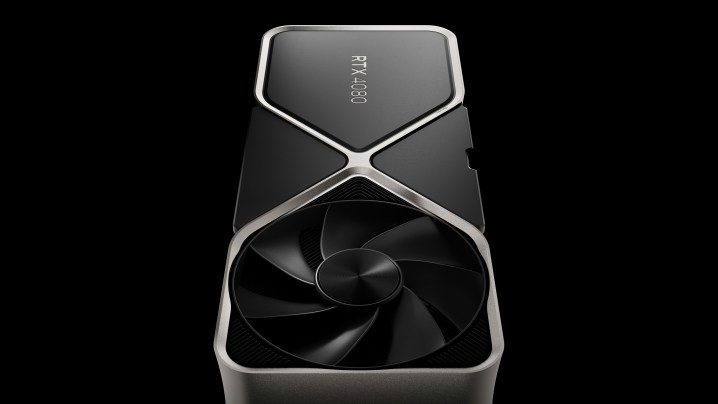Nvidia has finally announced the RTX 40 series, and three new RTX 40 cards will be available later this year: the flagship RTX 4090, the high-end RTX 4080 16GB, and the RTX 4080 12GB. Along with apparently massive performance improvements over last-generation RTX 30 series cards, these new GPUs come with high price tags.
How much does the RTX 4090 cost?

The flagship RTX 4090 is launching with an MSRP of $1,599, which is $100 higher than the $1,499 MSRP of the RTX 3090 and $400 lower than the $1,999 MSRP of the RTX 3090 Ti. $100 extra for Nvidia’s new flagship isn’t that much when the RTX 3090 was already so expensive, so not much has changed here.
| RTX 4090 | RTX 3090 | |
| Process | TSMC 5nm | Samsung 8nm |
| Architecture | Ada Lovelace | Ampere |
| CUDA cores | 16,384 | 10,496 |
| Memory | 24GB GDDR6X | 24GB GDDR6X |
| Boost clock speed | 2520MHz | 1695MHz |
| Bus width | 384-bit | 384-bit |
| Power | 450W | 350W |
It’s actually surprising that the RTX 4090 doesn’t cost more because it has way more CUDA cores than the RTX 3090 and the RTX 3090 Ti. It still has more or less the same memory size and bandwidth, but that shouldn’t really be a cause for concern; Nvidia should know how much VRAM its GPUs need.
How much does the RTX 4080 cost?

Things are a bit more complicated with the RTX 4080, which has two different models: the 4080 16GB at $1,199 and the 4080 12GB at $899. That’s much more expensive than the RTX 3080 10GB, which launched at $699, but it’s cheaper than the RTX 3080 12GB, which launched at $1,249. That being said, the 3080 12GB has seldom been in good supply, and the price has been falling ever since the end of the GPU shortage. Compared to the standard RTX 3080 10GB, both RTX 4080 models are much more expensive.
| RTX 4080 16GB | RTX 4080 12GB | RTX 3080 | |
| Process | TSMC 5nm | TSMC 5nm | Samsung 8nm |
| Architecture | Ada Lovelace | Ada Lovelace | Ampere |
| CUDA cores | 9,728 | 7,680 | 8960 / 8704 |
| Memory | 16GB GDDR6X | 12GB GDDR6X | 12GB / 10GB GDDR6X |
| Boost clock speed | 2505MHz | 2610MHz | 1710MHz |
| Bus width | 256-bit | 192-bit | 384-bit / 320-bit |
| Power | 320W | 285W | 350W / 320W |
At first glance, this different amount of memory business might sound like the difference between the RTX 3080 10GB and the RTX 3080 12GB, which have very similar performance but a large difference in price. However, these two different 4080s differ greatly not just in memory size and price but also in other specifications.
The RTX 4080 16GB has 9,728 CUDA cores, while the RTX 4080 12GB has just 7,680. The memory bandwidth on the 12GB model is also much lower since it has a 192-bit bus compared to the 256-bit bus on the 16GB version. The 12GB card does have a slightly higher clock speed, but that’s more than offset by the lower amount of cores and memory bandwidth. The 16GB and 12GB are effectively very different GPUs and not just merely different versions of the same card, hence the $300 price difference.
Which RTX 40-series GPU should you buy?

Until the reviews are in, it’s hard to recommend any of the RTX 40 series cards Nvidia has revealed so far. These are some of the most expensive GPUs ever released (which hasn’t been received well by most users), and even if RTX 40 is as fast as Nvidia says it is, these high price tags are definitely going to negatively impact the value proposition of these cards.
That being said, Nvidia’s new GPUs do seem priced sensibly relative to each other. The RTX 4080 16GB offers over 2,000 more CUDA cores, 4GB more VRAM, and more memory bandwidth than the RTX 4080 12GB for $300 more. For another $400, you could get the RTX 4090, which comes with 6,000 more CUDA cores, 8GB more VRAM, and even more memory bandwidth. The 4090 is actually in a class above the 4080 16GB, unlike how the RTX 3090 was just an RTX 3080 with a few more cores and higher TDP.
If you’re going to spend hundreds of dollars on a cutting-edge GPU, it might just be worth it to go all out and get the RTX 4090. At least then you won’t be wanting for more, even if it is one of the most expensive gaming GPUs ever made. On the other hand, you still get faster ray tracing performance and DLSS 3 with the much cheaper RTX 4080 16GB and 12GB.
Editors’ Recommendations




